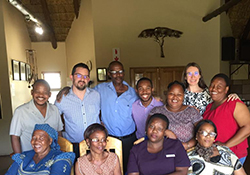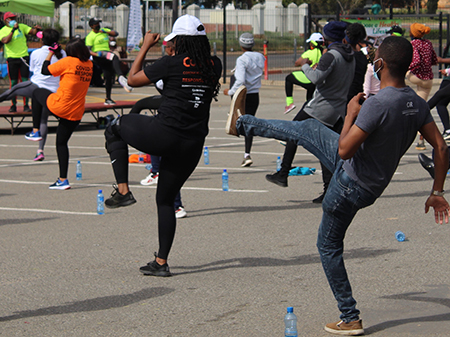In a time of Covid-19 fatigue, citizens are now confronted with an even deadlier and highly transmissible Delta variant. This new virus mutation impacts on already overburdened and under-resourced health systems. More alarming is that on day 460 of the lockdown in South Africa, less than 1% of the population was fully immunised.
Also, in June, less than 0,9% of the African continent has been immunised, compared to 28,2% of the Canadian and almost 50% of the United States’ populations. For transdisciplinary health researchers, this difference between the Global North and Global South during the Covid-19 pandemic is nothing new. It is part of what is known as the “10/90 gap”. This gap describes the disproportion when less than 10% of global research funds are spent on diseases that afflict more than 90% of the world’s population.
The 10/90 gap is also being addressed through the work of the Sisulu Foundation for African and Pandemic Disease Response. This includes the positive first results from pre-clinical trials on a Covid-19 candidate vaccine developed by Prof Markus Depfenhart, an North-West University (NWU) extraordinary professor based in Germany, and an unprecedented collaboration between various African and European universities and governments to establish a strong collaborative training, research and full vaccine development value chain.
The promising pre-clinical trials resulted from months of joint efforts between the Walter Sisulu University (WSU) and the NWU, ably supported by Hannes Malan from the NWU Technology Transfer and Innovation Support (TTIS) office.
The foundation’s vision fits well with that of the Africa Unit for Transdisciplinary Health Research (AUTHeR) at the NWU. AUTHeR is the host unit of Prof Depfenhart and emphasises the need for the self-sufficiency of African nations in a pandemic environment.
Correcting the disconnect in disease response
The disconnect between health policies in developed countries and those in Africa is also nothing new to researchers from AUTHeR. The research entity has a dedicated group of transdisciplinary researchers that is actively confronting the 10/90 gap by engaging and activating community fora to take control over their own health.
In one such example, the Prospective Urban and Rural Epidemiology (PURE) study, a 27-country study focusing on the prevalence of risk factors and how these lead to the development of chronic diseases, has been ongoing in the North West Province for the past 16 years under the national leadership of Prof Lanthé Kruger. This Canadian-designed study collects data from people living in rural and urban communities.
AUTHeR has enhanced community participation in data collection by addressing the limitations of traditional research programme methodology and directly incorporating community views and inputs through community forum participation. This approach has enabled community members to participate and actively assist researchers to collect data and report real-time results to forums which encourages and supports health promotion and behavioural change.
In response to the 10/90 gap, transdisciplinary researchers have had to transform traditional research to enable reciprocal community-integrated projects. When the national lockdown limited AUTHeR’s research activities in communities, Dr Christi Niesing was able to transform face-to-face contact with community forums into virtual contact through WhatsApp groups and Facebook. Despite the resource limitations in these communities, their long-term trust relationships with AUTHeR’s researchers enabled a digital transformation.
Research initiatives from AUTHeR are conducted from a unique health promotion and research platform with existing community entry points, established relationships and a real-time database. Examples are the North West on Wellness (NoW!) platform where wellness champions are the intermediators between communities and healthcare providers.
“One needs to understand the local health contexts,” says Prof Kruger. Her colleague, Dr Niesing, adds that, “Today, more than ever, we need to get practical solutions to systemic and wicked problems in Africa.”
For example, apart from providing research data to the global science arena, the PURE-SA study also invests in the transfer of skills to ordinary people and fieldworkers, which empowers communities, giving them their own voice to participate in matters concerning their health. In this way, the Sisulu Foundation for African and Pandemic Disease Response is supporting collaborative, home-grown participation by African countries to gear ourselves against the current crisis and future global pandemics.
 |
 |
AUTHeR is regularly engaging with communities in which they conduct research. Two of these engagement sessions took place last year when forum meetings were held in Ganyesa and Jan Kempdorp respectively.

AUTHeR’s Aerobics Marathon Move for Health Day took place on 20 May.
